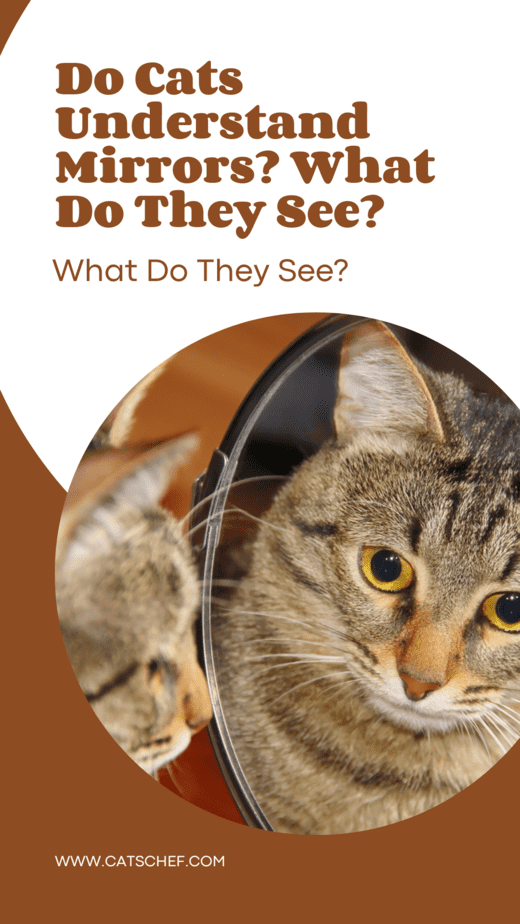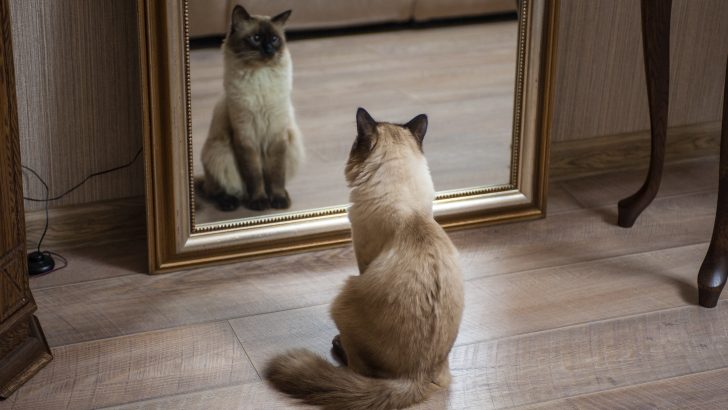We’re here today to answer another interesting question that I’m sure many cat parents have pondered over, and it is, “Do cats understand mirrors?”
I’m sure many of us have found it quite funny and amusing when our kitties would stand aghast in front of a mirror. The look of pure confusion their little furry faces have is the biggest daily dose of dopamine one could ask for.
No wonder why many cat parents decide to spend playtime with their feline companions teasing them with mirrors. It truly never gets old and will forever be entertaining. Especially if their cat happens to be interested in it.
As a child, I used to be so fascinated by it. Seeing how my kitty acts and reacts to mirrors in my childhood home never stopped amusing me. She was so adorable every single time, all I could do is watch her and be truly content. One of the best childhood memories, for sure!
Even today, like many other cat parents, I anticipate my cat’s encounter with mirrors or any reflective surface for that matter. I’m always curious how she will react to it.
However, we cannot help but wonder whether cats understand that what they’re looking at is actually their reflection. Do they know that the cat looking at them is actually themselves? Is this harmless play in our eyes actually harmful to our kitties and their perception of reality?
This article has all the information we need!
So, do cats understand mirrors? Let’s cut to the chase and finally find out!
Mirrors and self-awareness
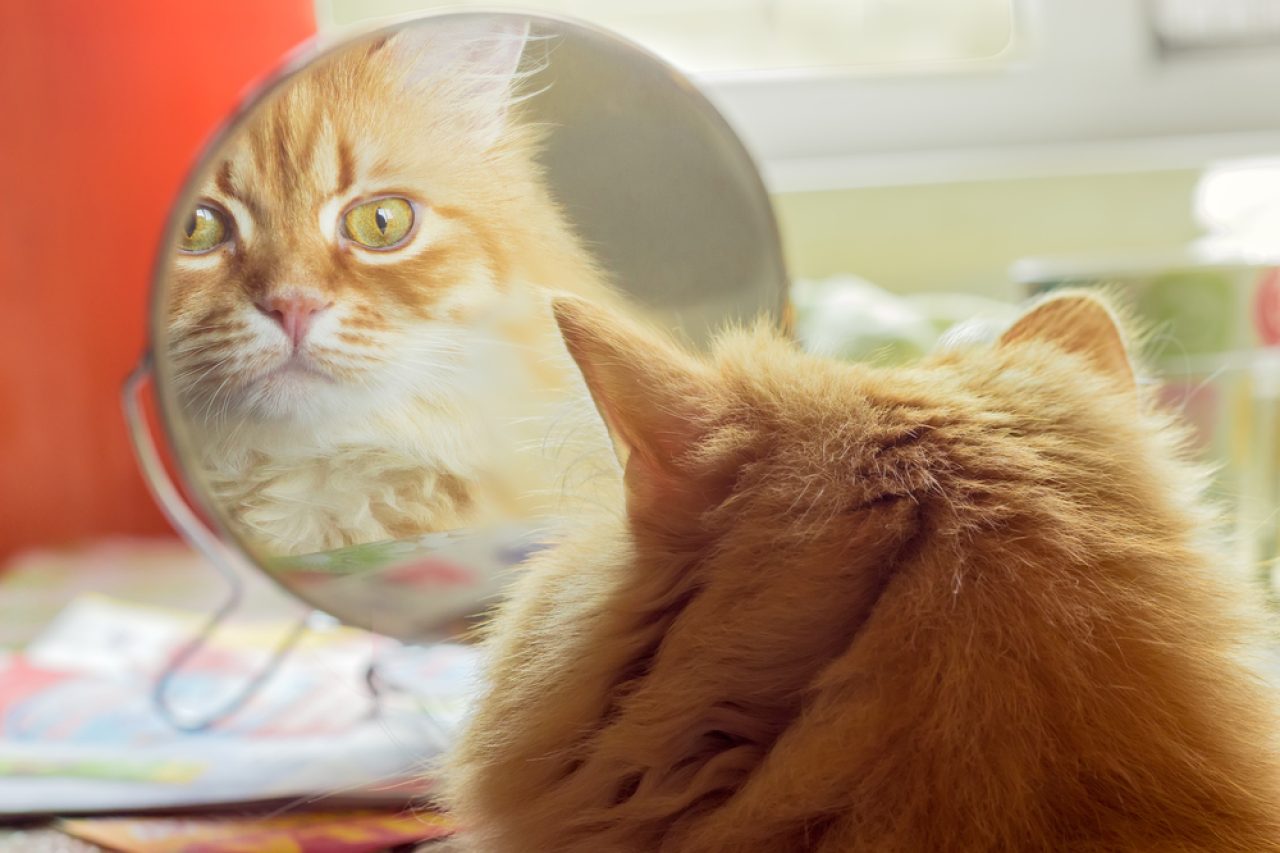
People have been fascinated by mirrors since the beginning of time. Well, maybe not by the concept of mirrors known to us today. But definitely by the first time they saw their reflection in the calm, dark pool of water on a lovely sunny day.
What must have gone through their head, I wonder. “Who are the people, and what are they doing in the water? Look, they’re moving their hands at the same time as we do. How strange!”
People moved from their reflection in deep waters to actual mirrors only about eight thousand years ago. The first mirrors were made out of polished stones, such as obsidian, and the image was dark and very distorted.
Later on, mirrors were crafted out of polished brass or copper and were very expensive. Modern mirrors that we know and use today date back to the 15th century when European glassmakers came out with a process of coating clear glass with a reflective metal, like silver or aluminum.
All in all, mirrors work on the principle of light reflection. In order to see yourself in the mirror, you have to come close to it, the light has to bounce off of you, hit the mirror, bounce back at the same angle as that of incidence, and finally reach your eye.
Not many people think about this complex process as they fix their hair in the morning or put on make-up. We grew accustomed to them that we don’t think about their significance. But, mirrors were crucial for the first humans in gaining self-awareness.
Today, we are able to recognize ourselves as individuals and acknowledge our physical features thanks to mirrors. This genius discovery is an important part of telescopes and microscopes, too. And we all know what’s the purpose of the rear-view mirrors in our cars, right?
It’s tough to imagine a life without mirrors, for sure!
Do cats understand mirrors?
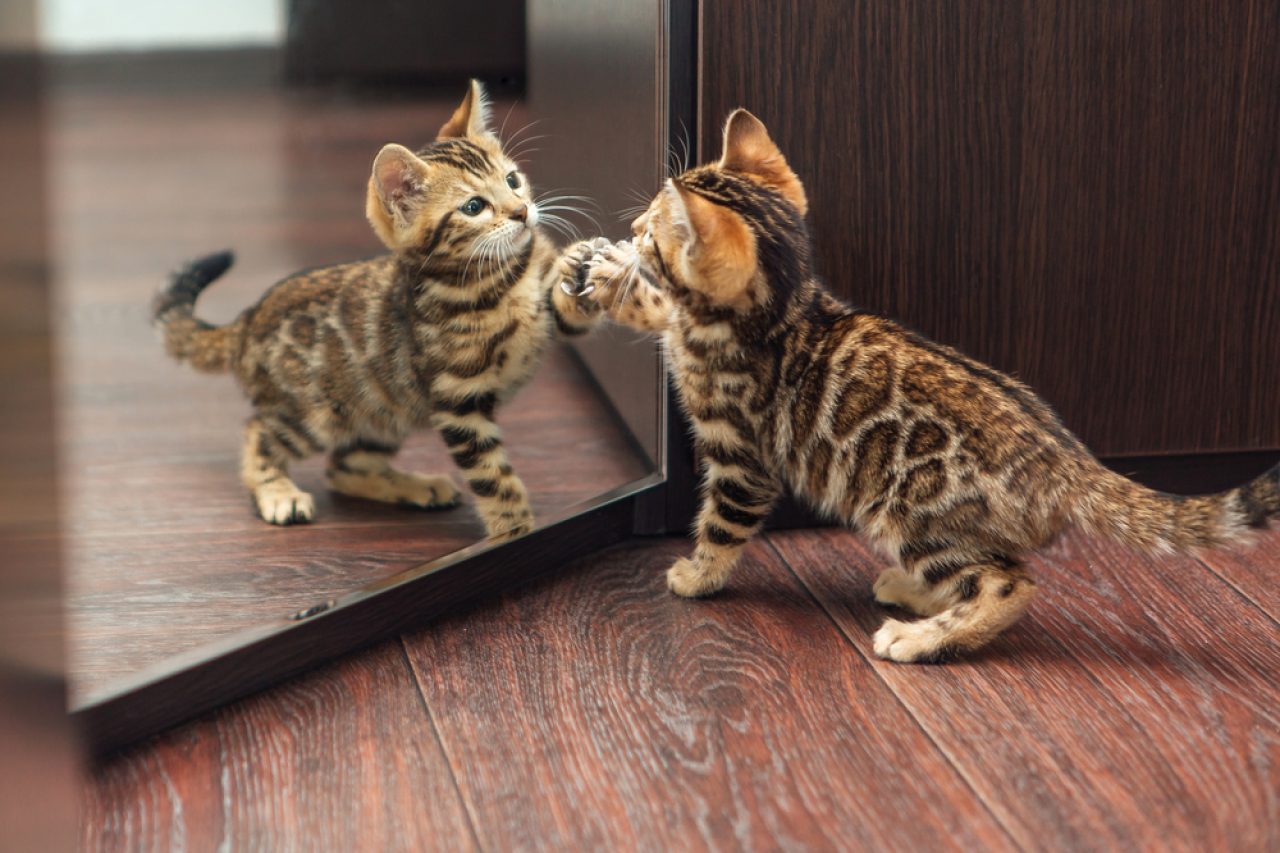
Now that we covered a brief history of mirrors, discussed the principle on which mirrors work, and talked about their significant purpose in our lives along with their connection to our self-awareness, it is time to see whether the same things can be applied to our feline friends.
So, let’s see. Do cats understand mirrors?!
Well, you actually might be surprised by the answer. Even though our fluffballs are extremely intelligent and one of the smartest animals on the planet, they cannot really comprehend the concept of mirrors.
If you see a kitty looking straight in the mirror or pacing in front of it, you’d be wrong to assume she’s admiring her irresistible fluff and what a great job she had done with the self-grooming.
It’s not very likely she’s taking a long and hard look in the mirror to reflect upon her life decisions. She’s just confused by the strange (but beautiful!) kitty that’s staring right back at her.
So, cats can acknowledge the existence of mirrors, and they can react to the object reflected in them, but they are unable to recognize that reflection as themselves. For our fluffs, that cat staring back at them is a competition and a potential threat.
Cats have this relationship with other reflecting surfaces, including window glass. That’s why you frequently see your cat looking confused at the window or even scratching it. You’ve just done a pretty good job of cleaning it, and she is confused. “Why is there another cat on the windowsill, mom?”
The mirror self-reflection test
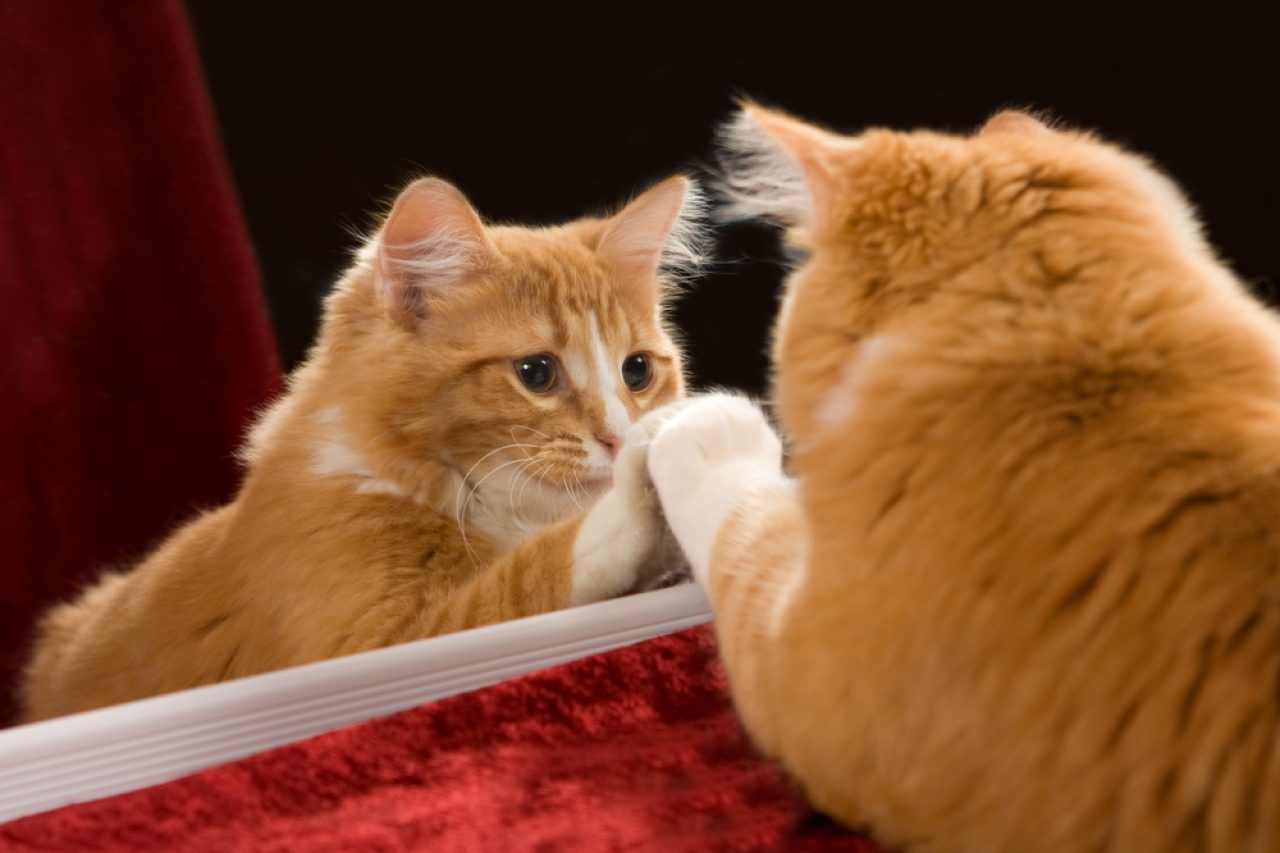
To answer the question, “Do cats understand mirrors?” in more detail, and to talk more thoroughly about feline self-awareness, we have to mention the famous mirror self-reflection test, introduced in the 1970s by psychologist Gordon Gallup.
Also known as the red dot test, its primary goal was to determine if any member of the animal kingdom had a noticeable self-awareness. To put it plainly, Gallup wished to see if any animal can look in a mirror and know what that reflection actually is.
He placed an unscented red dot on the animals’ foreheads when they were asleep and put a mirror in front of them shortly after they had woken up. If the animal looking in a mirror focused its attention on the red dot on the forehead, he had proof that the animal had a sense of self-awareness.
Many animals have passed this test, including Bottlenose dolphins, Killer whales, Bornean orangutans, Chimpanzees, Asian elephants, and others. Cats on the other hand, alongside dogs and some species of birds, have not been so successful.
Does this mean cats don’t have self-awareness?
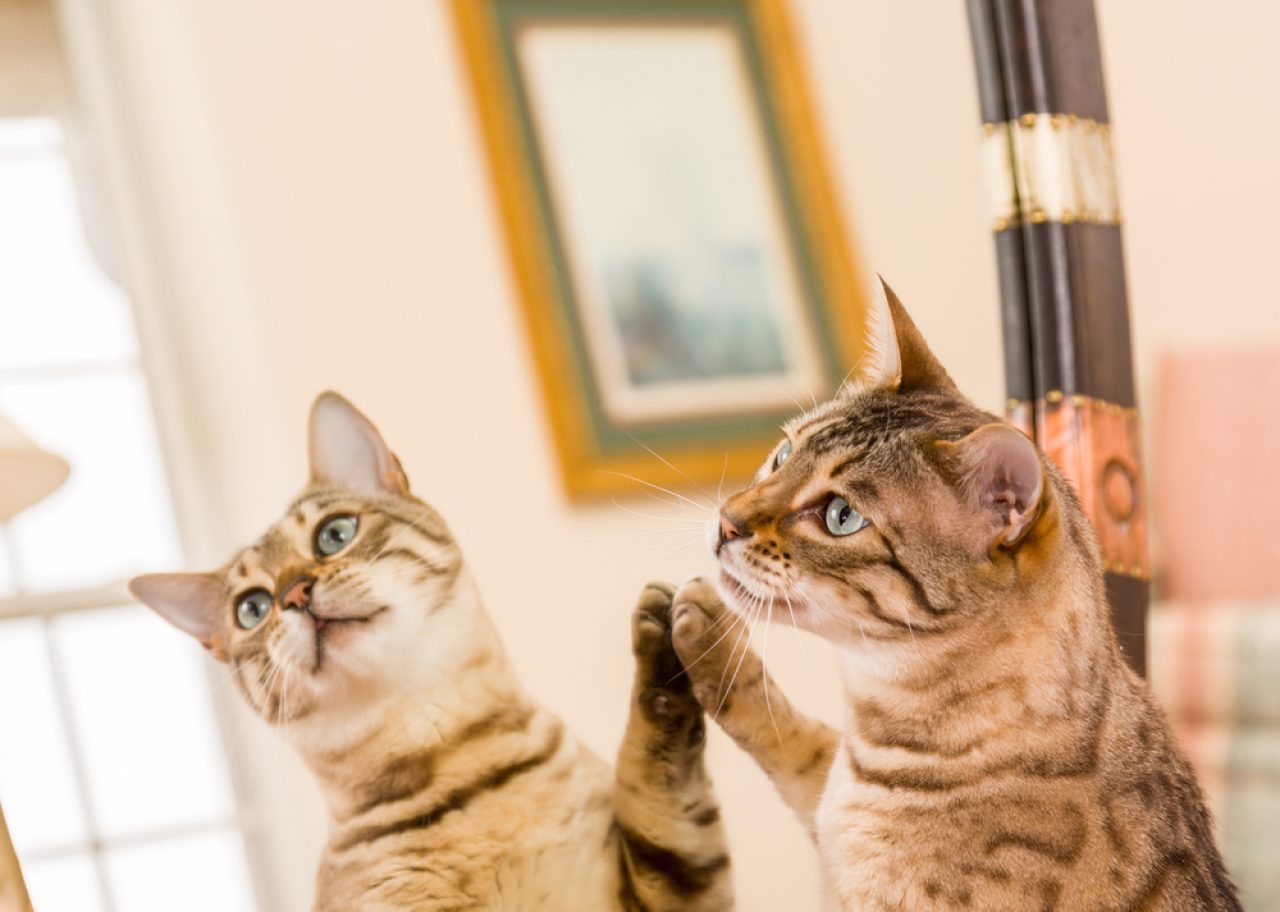
Absolutely not! Many scientists said that the mirror self-reflection test has one inevitable flaw, and that is assuming that animals even care about the dot on their forehead. Also, not all animals perceive the real world the same way and their senses are not equally dominant.
Contrary to Gallup’s mirror test, our feline companions have some understanding of what’s going on, and they do possess some sense of self-awareness. However, the correct extent of it remains a mystery.
Our cats might not know that it’s them when they look in the mirror, but it’s unfair to assume they are totally unaware of themselves. They express this complex personality feature by knowing what their body is capable of doing or by acting upon their desires and feelings.
That’s why your cat responds to the sound of her food can being opened by meowing and purring at you, or why she jumps around and on your furniture in order to prove how amazing her skills are. She knows who she is and what awesome things she can do.
She’s just always baffled by mirrors and never seems to learn that’s her. Nobody’s perfect and everybody has a right to have some flaws, even our purrfect felines.
The reason behind their strange relationship with mirrors is hidden in the fact that cats don’t have the best vision. An average cat’s visual acuity is about a tenth that of a human’s, so she struggles to recognize objects more than 20 feet away, and she cannot distinguish shades and hues.
For the most part, cats rely on their senses of smell and hearing and much less on their sense of sight. And since the image in the mirror doesn’t have any intriguing scent and doesn’t produce any noise, they are not particularly aware of that peculiar occurrence.
Unlike humans, cats don’t have the need to look at themselves in the mirror. They don’t really know what they look like to be able to recognize themselves in the mirror and be like, “Wow, I’m so beautiful today!”
They simply know they are fabulous and do not need any tangible proof of it.
How do cats react when they see themselves in the mirror?
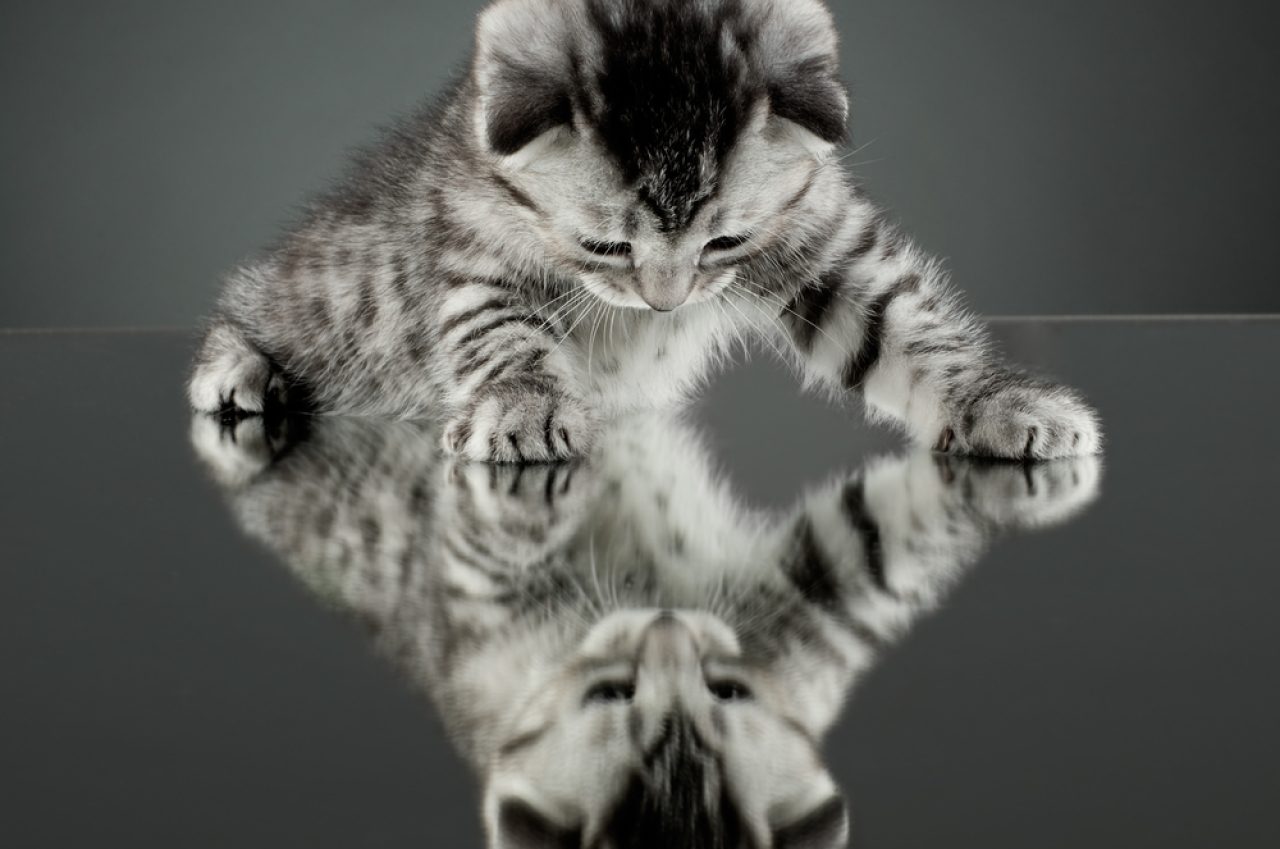
We already said that the answer to the question, “Do cats understand mirrors?” is no. But, we also mentioned that they do have some sense of understanding of what is going on.
It’s not like they look in the mirror and see nothing. They know that, when they look in the mirror, there is always a beautiful kitty staring back at them. They just never seem to remember that that beauty is them.
Cats can identify another cat pretty easily, either visually, by hearing her, or by her scent. However, nothing guarantees us that, upon meeting a fellow feline, some cats won’t be hostile.
Most cats display various warning signs when introduced to a new fluff. You probably know this if you happen to have a multi-cat home or a friend with whom you have cat play-dates.
If not previously familiar and not properly introduced, many cats will stare at their counterpart, hiss, and growl; or they might even physically fight each other.
So it shouldn’t come as a surprise when cats have similar reactions to mirrors since, as we have mentioned, they believe they are facing another cat.
How your kitty reacts to her reflection depends on many different factors you have to take into consideration.
For example, her personality. If your furbaby is generally calm and affectionate, her reaction to mirrors won’t be aggressive. However, if she’s a feisty little fellow, then be sure your mirror will inevitably be attacked.
Also, if your kitty had a traumatic past experience with another cat, she won’t enjoy a sudden fluff in the mirror. She might run away from it and hide somewhere she feels safe.
Below, you will find some of the most common feline reactions to their reflection in mirrors which I’m sure you’ve noticed in your kitty, too.
1. Some cats are curious
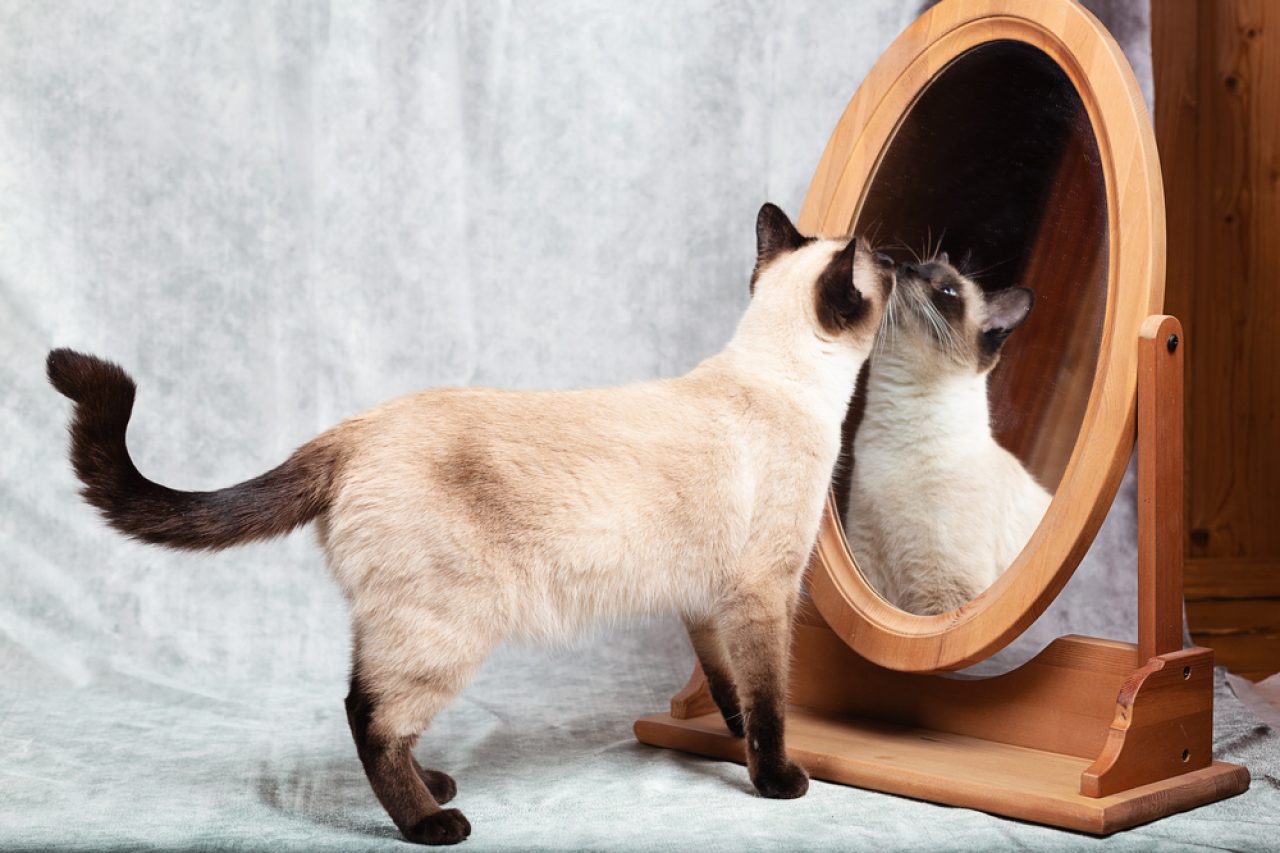
A generally calm and well-tempered cat might actually be fascinated by her reflection in the mirror and wish to learn more about it. She might meow and gently paw at it, and even attempt to sniff out this new and out-of-the-blue buddy.
When she realizes there is an unbreachable barrier (a.k.a. the glass) between her and her new bestie, she might even try to go around the mirror, attempting to see if he’s hiding on the other side.
This is the most entertaining and usually most desirable reaction a cat can have to mirrors. If you happen to be lucky enough and have a cat who reacts this way, make sure to offer your thanks to the cat gods because they surely blessed you with this one.
2. Some cats show aggression
On the other side, there are cats who get extremely aggressive upon seeing their reflection in the mirror. This reaction usually occurs with previously abused kitties who had some traumatic experiences either with humans or other cats and animals in general.
Cats who are territorial can also show signs of aggression. They might perceive this new cat in the mirror as a potential threat whose mission is to steal something that originally belongs to them.
Aggression is shown through hissing, growling, snarling, and swatting at the mirror. The tail of an aggressive cat can be puffed and start to twitch, their ears can get flatted, pupils dilated, and their backs arched.
Something that does not help this situation is the fact that the cat in the mirror does the same thing as the aggressive cat. This is like adding fuel to the fire – it does not calm the cat and makes her even more aggressive because it somehow confirms that this new cat is actually a threat.
So, a cat that gets into a fight with herself will most likely avoid encountering mirrors in the future. Because she knows that’s the place where the vicious enemy lives.
3. Some cats are afraid
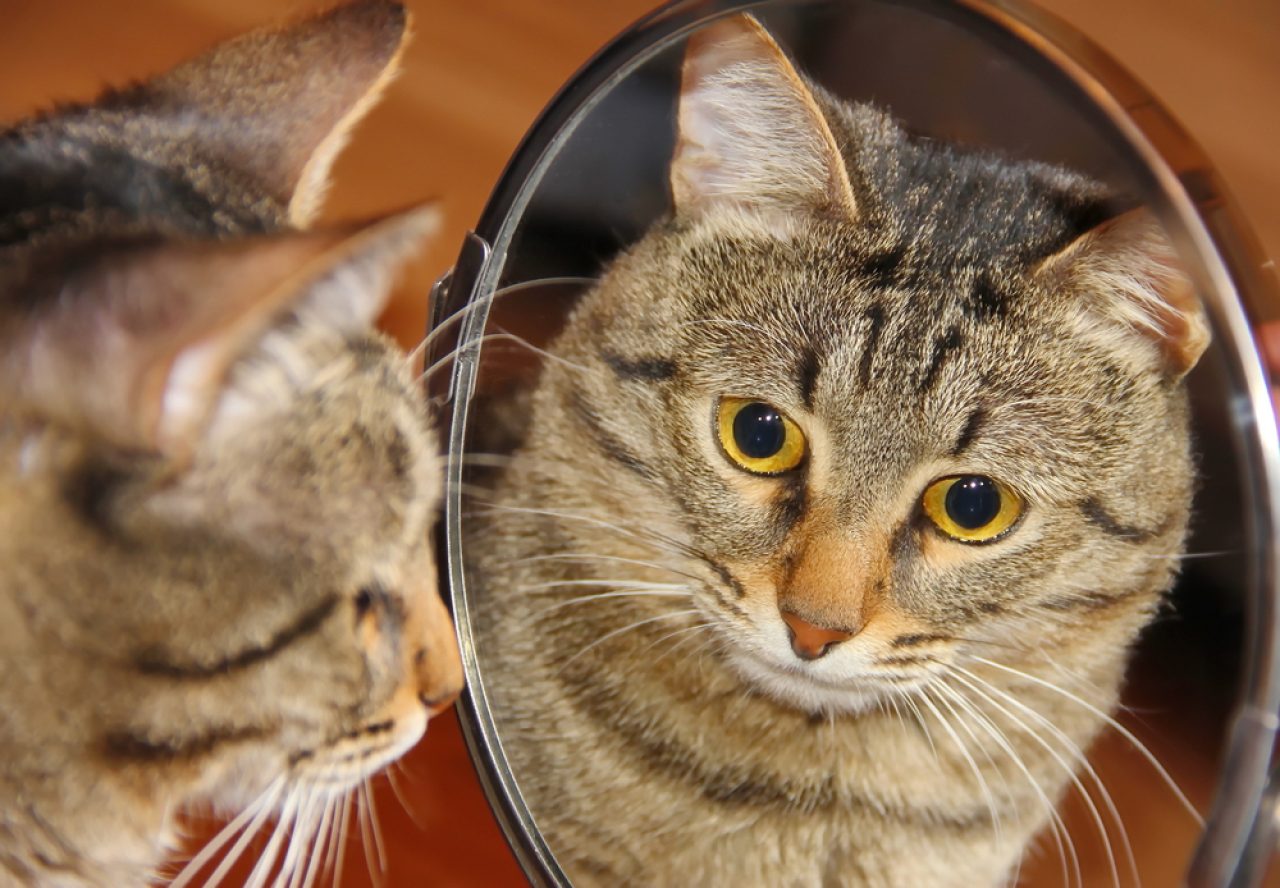
Similarly to aggressive cats, scared kitties will also dislike the new intruder. However, they’ll display their dissatisfaction not by angry outbursts but by running away and hiding.
Cats who are afraid of mirrors are usually cats who are never the dominant ones in the group. They are extremely shy and anxious, and easily susceptible to various external stimuli. These fluffs will hide from other, real cats, too; not only from their own reflection in the mirror.
When a kitty is scared, she’ll often seek a hiding spot, somewhere she feels safe and secure. She might stay in that spot for so long and decide to leave it only when she feels it’s okay and the threat is gone.
No matter how persistent you are in calling her to join you on the couch – she’ll only come when she gains her confidence back.
Some felines can also be afraid of their reflection because they somehow found the connection between mirror glass and window glass. If they happen to spend a lot of time sunbathing on the windowsill, they probably saw their faint reflection in the window.
However, if they once saw a cat or a stray dog outside, which, for example, gave her a hostile look, they might be under the impression that the same menace awaits them when they take a look in the mirror.
4. And some have no response at all
Let’s be honest: how many times have you prepared something special for your kitty only to witness her walking right past it and ignoring it completely? Many times, right? I know I have.
I remember that viral cucumber prank people were doing to their cats. They would place a cucumber behind their fluffs’ back, and they’ll frantically jump away from it. My kitty, however, was not that impressed by it. She just lightly sniffed it and moved on.
If your kitty is hard to impress, then she probably doesn’t have any reaction to her reflection, whatsoever. With her aloof personality and laid-back and indifferent attitude, she might just blankly take a look in a mirror and move on with her little furry life.
Maybe your kitty has no response because she is already familiar with the concept of mirrors, and she knows that there’s nothing on the other side. Maybe she thinks that’s just some magical Hogwarts-like moving image which, although gorgeous, is not that amusing.
Either way, no response is better than an aggressive response, for sure.
Final thoughts
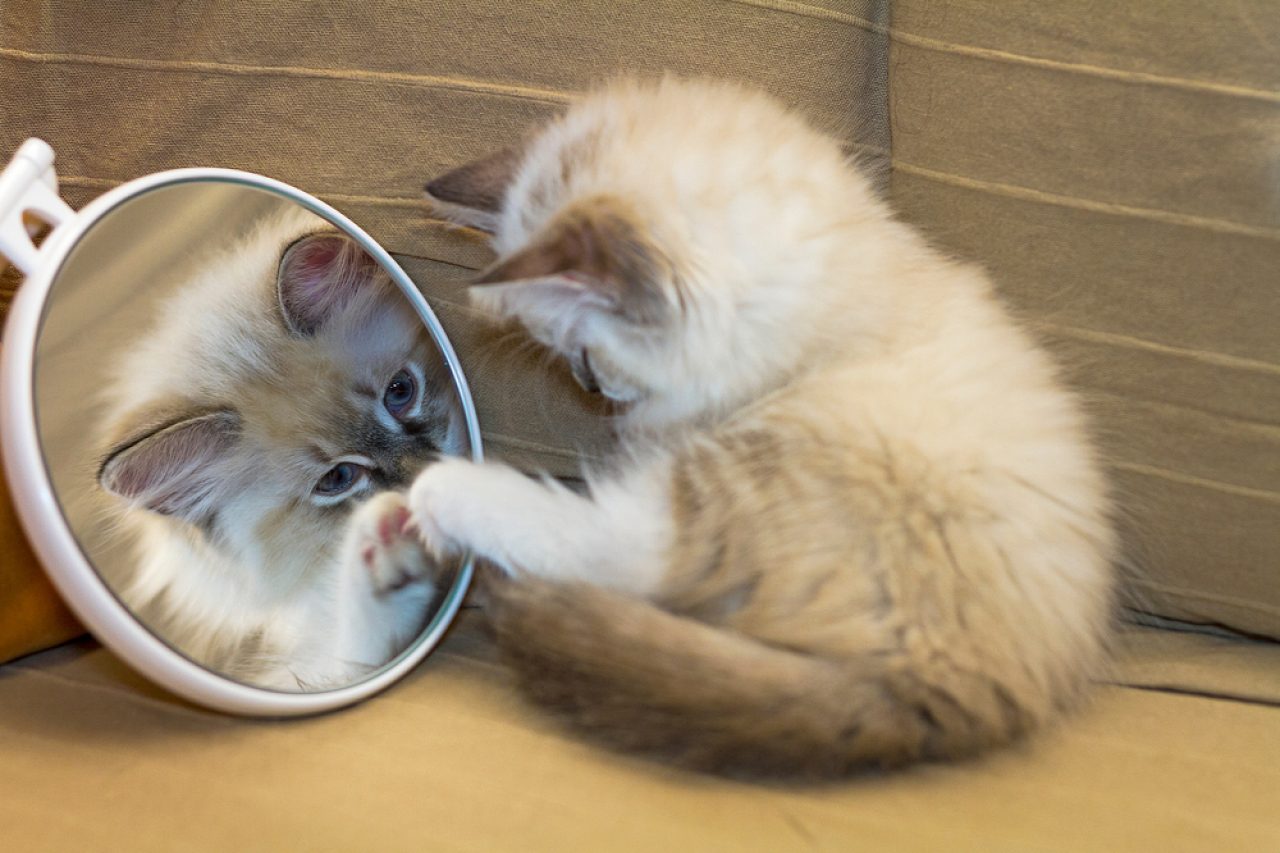
Today, we managed to answer, “Do cats understand mirrors?” and also learn about many interesting facts. Hopefully, the information you’ve found here was helpful and fun to read about and will aid you in your attempts to understand your fluffball.
Our feline buddies might not comprehend the concept of mirrors as we humans do. They might not recognize that the cat looking back at them is them, and they might be confused if she sees you and herself in the mirror at the same time.
It’s hard for us to understand that there are everyday things from our world they simply don’t get, which is totally fine since there are plenty of things we don’t understand about their little fluffy world.
As long as we manage to work together and provide each other with all the things we miss – the world will be in purrfect balance.
When it comes to your cat’s relationship with mirrors, this is not one of those situations when you have to immediately contact the vet. If your cat has no specific reaction to it, you can just let her be.
If, however, she is overly aggressive or scared, you can consider moving the mirror somewhere where she can’t reach it or covering it, so she doesn’t get the urge to attack or run away. You don’t want your kitty to develop anger issues or become highly anxious.
If there’s a way to prevent it, make sure to do so! Otherwise, get popcorn and enjoy the show your kitty prepares for you each time she steps in front of a mirror!
